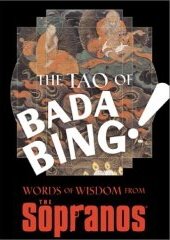
What Would Tony Do?
It's tough to be a mob boss. This season of HBO's The Sopranos excels in exploring Tony Soprano's world; just as The Tao of Bada Bing! (2003) delves into the correspondences between that world and the philosophies of Lao Tzu's Tao Te Ching. The book is a compilation of scripted dialogue from the show as conceived by its creator, David Chase. Also cleverly interwoven through the series is Sun Tzu's The Art of War.
The Chinese correspondences do not end there. Tony has to constantly tap into the vital forces of yin and yang. In the latest episode, after a period of post-operative yin reflection and a renewed reverence for life, he suddenly leaps forward with yang energy to reassert his dominance over his crew of "jackals." After another enlightening session with his longterm crush and therapist Dr. Melfi, he realizes the need to spring into action -- particularly in light of the negative macho reaction to Johnny Sack's brief crying jag at his daughter's wedding. The interplay of energies keeps everything in motion, with a constant "give and a take," to quote Tony again. Sometimes you just have to get physical.
Two of my favorite phrases from the series are "always with the mouth" and "this is a business." The impulsive violent tendencies of these guys often unleashes their wild out-of-control yang at the worst possible moments; whereas the idea of keeping in mind the bigger picture, and therefore maintaining as much harmony as possible, is calmer yin, and harder to maintain among men. Tony must utilize both and be prepared to spin the wheel at any moment. He is usually under extreme pressure to keep everything balanced despite always erupting turf wars and relentless FBI surveillance. It's no wonder he suffers from anxiety attacks (bad yin) and problems with impulse control (bad yang). He restores harmony, but only until the next worldly crisis.
Leave it to David Chase (originally named David DeCesare, 8/22/45-) to realize the applicability of ancient Chinese observations to today's world. He is not the first, of course, but it's hard to beat the epic sweep and depth of this series and the way he does it.
The fine line between comedy and tragedy, too, is always apparent in character, plot, conflict, and provisional resolution. Not everything is resolved, and mysteries abound. Chase has acknowleded his desire to infuse some of the spirit of interesting and thought-provoking international films (ex. Fellini's work) into this serialized format, and he and his production team have succeeded brilliantly.
Like any great epic, the real center and driving force must remain in the person of Tony Soprano. The series must ultimately live or die with Tony, part flawed hero and part villain or anti-hero. That's one of its many vulnerable strengths and delicately wrought beauties.
Cheers to Tony!






2 comments:
I love Tony so much. Thanks for the comments.
Love the insights -- you have a good way of putting things.
Post a Comment